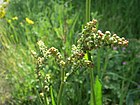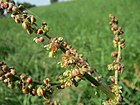Note: This is a project under development. The articles on this wiki are just being initiated and broadly incomplete. You can Help creating new pages.
Difference between revisions of "Rumex acetosella - Sheep's sorrel"
(→Mode of Propagation) |
(→Common names) |
||
| Line 13: | Line 13: | ||
==Common names== | ==Common names== | ||
| − | {{Common names|kn=|ml=|sa=|ta=|te=|hi=|en= | + | {{Common names|kn=|ml=|sa=|ta=|te=|hi=|en=Sheep's sorrel}} |
==Properties== | ==Properties== | ||
Revision as of 17:35, 4 June 2018
Rumex acetosella is a species of flowering plant in the buckwheat family Polygonaceae. The plant and its subspecies are common perennial weeds.
Contents
- 1 Uses
- 2 Parts Used
- 3 Chemical Composition
- 4 Common names
- 5 Properties
- 6 Habit
- 7 Identification
- 8 List of Ayurvedic medicine in which the herb is used
- 9 Where to get the saplings
- 10 Mode of Propagation
- 11 How to plant/cultivate
- 12 Commonly seen growing in areas
- 13 Photo Gallery
- 14 References
- 15 External Links
Uses
fevers, inflammations, kidney and urinary tract diseases, intestinal parasites, eczema, herpes, itchy rashes, digestive problems, Sore throats
Parts Used
Chemical Composition
Crysophanic acid, and an iron-greening tannin. In the early stage of its growth, it abounds in oxalic acid[1]
Common names
| Language | Common name |
|---|---|
| Kannada | |
| Hindi | |
| Malayalam | |
| Tamil | |
| Telugu | |
| Marathi | NA |
| Gujarathi | NA |
| Punjabi | NA |
| Kashmiri | NA |
| Sanskrit | |
| English | Sheep's sorrel |
Properties
Reference: Dravya - Substance, Rasa - Taste, Guna - Qualities, Veerya - Potency, Vipaka - Post-digesion effect, Karma - Pharmacological activity, Prabhava - Therepeutics.
Dravya
Rasa
Tikta (Bitter), Kashaya (Astringent)
Guna
Laghu (Light), Ruksha (Dry), Tikshna (Sharp)
Veerya
Ushna (Hot)
Vipaka
Katu (Pungent)
Karma
Kapha, Vata
Prabhava
Habit
Identification
Leaf
| Kind | Shape | Feature |
|---|---|---|
| Simple | Leaves are Lobed or unlobed but not separated into leaflets |
Flower
| Type | Size | Color and composition | Stamen | More information |
|---|---|---|---|---|
| Unisexual | 2-4cm long | pink to red | six | There are two or more ways to evenly divide the flower |
Fruit
| Type | Size | Mass | Appearance | Seeds | More information |
|---|---|---|---|---|---|
| General | 0.9–1.5 mm | The fruit is dry but does not split open when ripe | With hooked hairs | many | {{{6}}} |
Other features
List of Ayurvedic medicine in which the herb is used
- Vishatinduka Taila as root juice extract
Where to get the saplings
Mode of Propagation
How to plant/cultivate
Most gardeners consider sorrel a perennial pesky weed. It is in good company, as many medicinal plants such as dandelion, plantain, and nettle are disdained as weeds to be rooted out of garden and lawn.[3]
Commonly seen growing in areas
Heaths and acid grasslands, A weed of acid soils, Borders of forests and fields.
Photo Gallery
References
External Links
- Ayurvedic Herbs known to be helpful to treat fevers
- Ayurvedic Herbs known to be helpful to treat inflammations
- Ayurvedic Herbs known to be helpful to treat kidney and urinary tract diseases
- Ayurvedic Herbs known to be helpful to treat intestinal parasites
- Ayurvedic Herbs known to be helpful to treat eczema
- Ayurvedic Herbs known to be helpful to treat herpes
- Ayurvedic Herbs known to be helpful to treat itchy rashes
- Ayurvedic Herbs known to be helpful to treat digestive problems
- Ayurvedic Herbs known to be helpful to treat Sore throats
- Herbs with Leaves used in medicine
- Herbs with common name in English
- Habit - Herb
- Index of Plants which can be propagated by Seeds
- Herbs that are commonly seen in the region of Heaths and acid grasslands
- Herbs that are commonly seen in the region of A weed of acid soils
- Herbs that are commonly seen in the region of Borders of forests and fields
- Herbs





